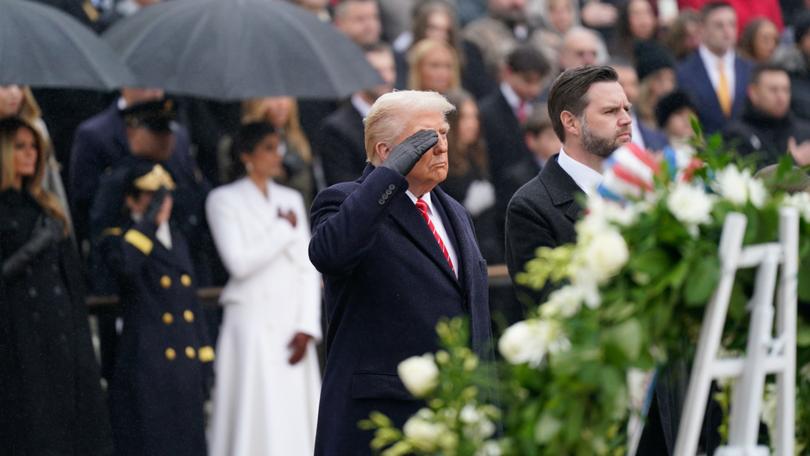THE WASHINGTON POST: Trump’s first orders could include border, oil drilling, DEI policies
President-elect Donald Trump is expected to sign ‘dozens and dozens’ of orders that will launch some 200 executive actions after being sworn in, showing his commitment to swiftly enacting his campaign promises.

President-elect Donald Trump is expected to sign “dozens and dozens” of orders that will launch some 200 executive actions after being sworn in Monday, to show his commitment to swiftly enacting policy changes he promised on the campaign trail, a person familiar with the matter said.
Stephen Miller, Trump’s incoming White House deputy chief of staff for policy, briefed congressional Republican leaders Sunday on the broad contours of what Trump is expected to sign, including sweeping changes related to the southern border, energy and the federal government workforce, said two people familiar with the call, who spoke on the condition of anonymity because the information had not been announced publicly.
The person who said Trump would sign “dozens and dozens” of orders was briefed on the actions and spoke on the condition of anonymity for the same reason.
Sign up to The Nightly's newsletters.
Get the first look at the digital newspaper, curated daily stories and breaking headlines delivered to your inbox.
By continuing you agree to our Terms and Privacy Policy.Lawmakers are expected to receive a list of the orders before Monday.
The broad outlines of the orders presented to lawmakers suggest Trump will prioritize rolling back regulations that prevent some oil drilling, as well as Biden administration policies that implemented diversity, equity and inclusion practices. One executive order is expected to declare a “crisis” on the U.S.-Mexico border, where illegal crossings have fallen significantly over the past year.
The Washington Post previously reported that Trump was considering an executive order reversing many of President Joe Biden’s energy policies in Alaska, including restrictions on oil and gas drilling in the Arctic National Wildlife Refuge. Trump has been “very sympathetic” to requests from Alaska politicians to open up the refuge, Sen. Dan Sullivan (R-Alaska) told The Post this month. A spokesman for Sullivan did not immediately respond to a request for comment Sunday.
A fourth person familiar with the plans, also speaking on the condition of anonymity to discuss actions that have not been made public, said the flurry of orders would include efforts to reduce the cost of living, pause offshore wind leases; terminate Biden-era rules promoting electric vehicles and abolish other efforts focused on combating climate change.
Trump began his speech at a rally in Washington, D.C., on Sunday evening alluding to the swift actions he would take, predicting that “by the time the sun sets tomorrow evening, the invasion of our borders will have come to a halt.”
“Starting tomorrow, I will act with historic speed and strength and fix every single crisis facing our country. We have to do it,” the incoming president said to a cheering crowd. “You’re going to see executive orders that are going to make you extremely happy. Lots of them.”
Trump said his actions would “deliver justice” to the families of U.S. citizens allegedly killed by people who have crossed the border illegally.
“Tomorrow, everybody in this very large arena will be very happy with my decision on the J6 hostages,” he said.
Nearly 1600 people have been charged with federal crimes stemming from the riot, according to the Justice Department. While Trump and his allies seem to broadly agree that many who breached the Capitol were unfairly prosecuted, there have been sharp divisions expressed about whether pardons should include those charged or convicted with violence on that day - including violence against police.
Pardoning those who faced the most serious charges would be an extraordinary statement about one of the most painful and divisive chapters of recent U.S. history, and would put Trump at odds with recent statements by Vice President-elect JD Vance, attorney general nominee Pam Bondi and lawmakers including Sen. Thom Tillis (R-North Carolina). Each has condemned rioters who attacked law enforcement personnel.
Executive orders can help Trump change policies put in place by Biden and, in some circumstances, circumvent Congress. But there are limits to what a president can accomplish unilaterally. Many of Trump’s orders are likely to be challenged in court by Democrats and left-leaning rights groups.
Some Republicans who participated in or were briefed about the call with Miller expressed skepticism afterward about whether the executive orders are strong enough to survive litigation.
Trump began his first term eight years ago with a number of high-profile executive orders - some of which were upheld by the courts and others that were successfully challenged.
At the rally on Sunday, Miller told the crowd that executive orders on immigration would come shortly after Trump is inaugurated. He did not elaborate on how the measures would work, describing them as “an executive order ending the border invasion, sending the illegals home and taking America back.”
Trump also previewed that he will outline measures his administration will take to address border security, which he described as “the most aggressive, sweeping effort to restore our borders the world has ever seen.”
On the campaign trail, Trump vowed to implement a number of immigration-related executive orders on his first day in office, including closing the border, ending “birthright citizenship” and restarting construction of a fence on parts of the U.S.-Mexico border.
Miller said on Fox News last week that Trump planned to issue over 100 executive actions during his first few days in office that would address everything from the federal bureaucracy to federal spending.
Isaac Arnsdorf, Maxine Joselow and Hannah Knowles contributed to this report.
© 2025 , The Washington Post
